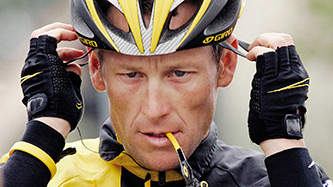Funny, I don't remember seeing any smoke in The Armstrong Lie. I mean, sure, there are lots of proverbial smoke and mirrors in this story of seven-time Tour de France champion Lance Armstrong. And, yes, it's safe to say that there's a smoke-like dark cloud that will forever overshadow Armstrong's legacy. But Oscar-winning director Alex Gibney is not prone to such literal, stylized, Errol Morris-like re-enactments in his films. Instead, he tells the story of the disgraced super cyclist as a straight-up, old-school, talking-head, journalistic documentary. Or so it seems. Like Armstrong, it appears that the secret to your success was to covertly manipulate the laws of nature.
Didn't you guys learn anything from making this film?
Why would you need to amplify a scandal that is essentially sports world's equivalent of faking the moon landing? Yes, Armstrong really did survive a severely advanced cancer. But the rest of the story - the one about a cyclist who, after his recovery, somehow became an even better athlete and completely dominated his field for years - needs an asterisk the size of Armstrong's once lemon-sized testicle.
Yet amidst all the drug-pumping and blood-dumping deception is also a story of one of the most successful private fundraising campaigns ever. Juicy stuff, right? It should be--except that for too much of the film your boss Gibney seems to be trying to get over the fact that he too was also duped. First-person narration is not the modus operandi for Gibney (best-known for Taxi to the Dark Side, Client 9: The Rise and Fall of Eliot Spitzer and We Steal Secrets: The Story of WikiLeaks), and he spends unnecessary effort explaining the production history of the very film we're watching.
When shooting began back in 2009, this was going to be a much different film. After retiring at the top of his game in 2005 and thereafter being hounded by rumors of blood-doping, Armstrong hoped to silence his critics by returned to cycling in 2009.
This is when Gibney came on board, expecting to document The Great Armstrong Comeback, Part Deux. Instead, Armstrong lied to his face, and to his cameras, and towed his familiar line of assuring everyone that the only scientific explanation for his super-human skills was hard work and dedication. Not entirely false, I suppose, seeing as, by Armstrong's own admission, he simply treated cheating drug tests like a sport-within-a-sport. And, boy, did he win big at that one.
After Armstrong finally confessed his sins to TV's Saint Oprah in January 2013, Gibney convinced Armstrong to sit down once more and come clean. But this preoccupation with answers and evasion causes him to lose sight of the bigger picture--as well as many opportunities to broaden the story. We at least get plenty of interviews with Armstrong's teammates and inner circle, leading to many revelations about mid-race blood transfusions and the surprising breadth of his network of collaborators.
But after two hours, I couldn't help but feel that the film was becoming repetitive, still only scratching the surface. Like something was still being hidden.
Behind digital smoke, perhaps?
Quitting while I'm ahead,
Christopher







